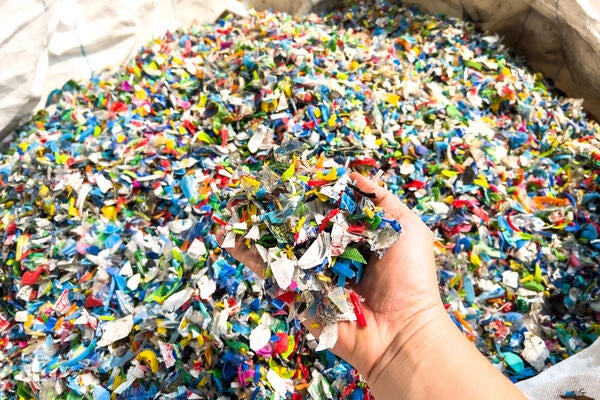
Waterloo researcher uses nano-materials to clean water
Juewen Liu uses DNA sequences and coloured hydrogel to detect and remove contaminants in the water.

Juewen Liu uses DNA sequences and coloured hydrogel to detect and remove contaminants in the water.
By Sue Bowness Communications and Public AffairsHave you ever wondered what harmful chemicals might be lurking in your water? Dr. Juewen Liu wants to make it easier to remove pollutants from mercury to lead; arsenic and more.
 Juewen Liu, Assistant Professor in Chemistry, University of Waterloo
Juewen Liu, Assistant Professor in Chemistry, University of Waterloo
An assistant professor in the Chemistry Department, Dr. Liu’s work was recently recognized with an Ontario Early Researcher Award. Dr. Liu is currently using DNA as a base upon which to bind unwanted molecules, like mercury, in water. For each contaminant, Dr. Liu and his team of researchers must look through a massive DNA library (think trillions) to find a specific sequence of DNA that will bind to a particular contaminant.
Then, researchers determine how to transfer the DNA sequence into a hydrogel with fluorescence (colour) that will not only make the contaminant visible to the naked eye, but also extract it from the water. Ultimately, Liu and his team are working to create devices that can be used to effectively remove all kinds of contaminants that are lurking in our water.
Dr. Liu’s lab is also working on other projects, all of which involve DNA. He studies the interactions between DNA and nano-materials with potential application for drug delivery systems and cancer detection. Again with this research he is still focused on real-world benefits.
“We want not only to pursue science but to have an impact on society,” says Liu. “We hope this research will eventually be applied to real cases in environmental protection and medical diagnosis.”
Back in the lab, Dr. Liu is also keen to have an impact on his graduate students. He currently supervises five graduate students and a postdoctoral fellow, along with a few undergraduates from the university’s co-op program. He likes to spend as much time in the lab with them as he can.
“I feel the best way to supervise students is to work very closely with them,” says Dr. Liu.
“I spend time with each student and make sure they are trained well and productive."

Read more
New evidence-based classification rules expand access and improve fairness for Para Cross Country and Para Alpine skiers

Hand holding small pieces of cut colourful plastic bottles, which Waterloo researchers are now able to convert into high-value products using sunlight. (RecycleMan/Getty Images)
Read more
Sunlight-powered process converts plastic waste into a valuable chemical without added emissions

Dr. Travis Craddock, professor and Canada Research Chair, says the team's findings change our basic knowledge of biology (University of Waterloo).
Read more
New study reveals quantum-level effects in biology with major implications for treatment of some brain diseases
The University of Waterloo acknowledges that much of our work takes place on the traditional territory of the Neutral, Anishinaabeg, and Haudenosaunee peoples. Our main campus is situated on the Haldimand Tract, the land granted to the Six Nations that includes six miles on each side of the Grand River. Our active work toward reconciliation takes place across our campuses through research, learning, teaching, and community building, and is co-ordinated within the Office of Indigenous Relations.